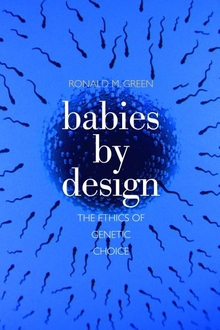Babies by Design
WARNING
You are viewing an older version of the Yalebooks website. Please visit out new website with more updated information and a better user experience: https://www.yalebooks.com
The Ethics of Genetic Choice
Ronald M. Green
Parents are already beginning to select their children’s genetic traits. The time to be talking about the challenges of genetic engineering is now.
We stand on the brink of unprecedented growth in our ability to understand and change the human genome. New reproductive technologies now enable parents to select some genetic traits for their children, and soon it will be possible to begin to shape ourselves as a species. Despite the loud cries of alarm that such a prospect inspires, Ronald Green argues that we will—and we should—undertake the direction of our own evolution. A leader in the bioethics community, Green offers a scientifically and ethically informed view of human genetic self-modification and the possibilities it opens up for a better future. Fears of a terrible Brave New World or a new eugenics movement are overblown, he maintains, and in the more likely future, genetic modifications may improve parents’ ability to enhance children’s lives and may even promote social justice. The author outlines the new capabilities of genomic science, addresses urgent questions of safety that genetic interventions pose, and explores questions of parenting and justice. He also examines the religious implications of gene modification. Babies by design are assuredly in the future, Green concludes, and by making responsible choices as we enter that future, we can incorporate gene technology in a new age of human adventure.
Ronald M. Green is Eunice and Julian Cohen Professor for the Study of Ethics and Human Values and director of the Ethics Institute at Dartmouth College. He was founding director of the Office of Genome Ethics at the National Human Genome Research Institute of the National Institutes of Health. He is the author of six previous books, most recently The Human Embryo Research Debates: Bioethics and the Vortex of Controversy. He lives in Norwich, VT.
“Green has actively engaged the topic of genetic engineering by not only providing the latest science, but by presenting arguments with all their attendant emotional baggage. The combination is a powerful one, but comes off exceptionally well.”—Eric M. Meslin, Indiana University Center for Bioethics
“Not only is Green’s scholarship rock-solid, he is also the most balanced and thoughtful of the many analysts in this area—neither an avid supporter who believes in science above all, nor an arch conservative who would take us back to the dark ages.”—Dean H. Hamer, molecular biologist and author of The Science of Desire, Living with Our Genes and The God Gene
“Green presents ethical positions and arguments in the context of modern thought, and in a language that will be accessible to scholars, scientists and lay-people.”—Lee Silver, Princeton University
"With his close and sound attention to the relevant science and his attention to the relevant religious, ethical, and policy perspectives and debates, Green has offered a well-integrated set of arguments that can serve to educate and guide students in courses in college and policy makers alike."—James F. Childress, John Allen Hollingsworth Professor of Ethics, Institute for Practical Ethics and Public Life, University of Virginia
“This is a brilliant and provocative book by one of the top—and most visionary—bioethicists in the world. It takes us into the era of directed human evolution, which may soon redefine people’s relationships, capabilities, and even our concepts of freedom and justice.”—Robert Lanza, Vice President of Research and Scientific Development at Advanced Cell Technology
“In this clear-eyed and generally optimistic book, both promise and risk are ably weighed and balanced. The science is clearly explained, and there are signposts to help guide us through the moral maze.”—Economist
“Green has written for a broad readership of nonspecialists. . . . accessible and engaging--qualities that are rare in the bioethics literature.”--Commonweal
Publication Date: December 2, 2008
4 b/w illus.








